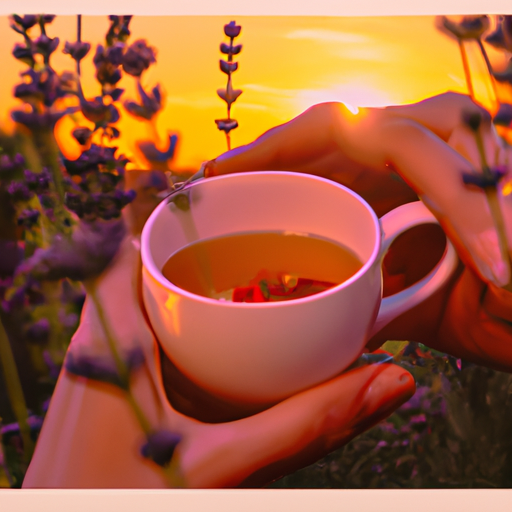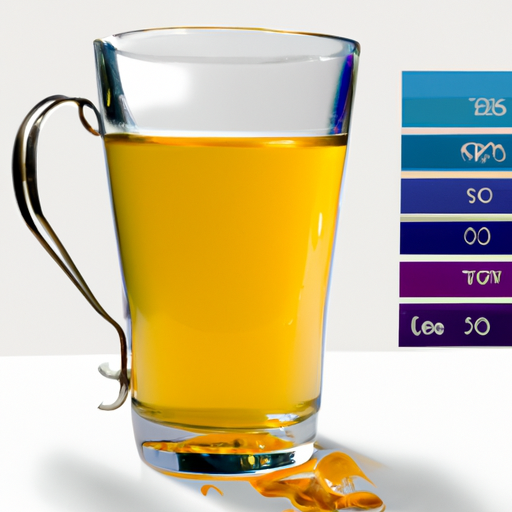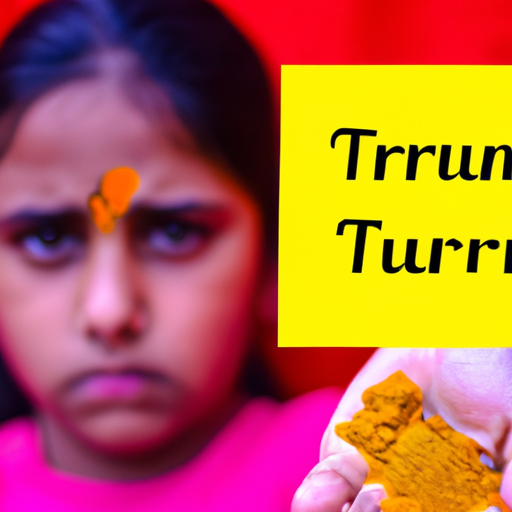As a person who has battled with anxiety throughout my life, I comprehend the significance of discovering efficient methods to cope with it. Although therapy and medication are traditional approaches that can be beneficial, there are times when we require a fast and simple solution in the heat of the moment. A popular choice that many individuals rely on is a soothing beverage. However, with a plethora of options available, it can be challenging to determine which ones are truly effective.
In this article, I’ll explore some of the most popular drinks for calming anxiety and what makes them effective.
Before we dive into specific drinks, it’s important to understand what anxiety is and how it affects us. According to the American Psychological Association, anxiety is ‘an emotion characterized by feelings of tension, worried thoughts and physical changes like increased blood pressure.’ It’s a natural response to stress, but for those of us with anxiety disorders, these feelings can be overwhelming and interfere with our daily lives.
Symptoms can include racing thoughts, sweating, shaking, and difficulty sleeping. While there is no one-size-fits-all solution for managing anxiety, finding a calming drink that works for you can be a helpful tool in your arsenal.
Key Takeaways
- Chamomile, kava, valerian root, lavender, and lemon balm tea are healthy alternatives to alcohol for managing anxiety.
- Warm milk contains tryptophan, which may help lower cortisol levels, while green tea has antioxidant properties and can promote relaxation and improve sleep quality.
- Incorporating chamomile, lavender, lemon balm, or passionflower into a drink can create a calming and anxiety-reducing beverage.
- It’s important to seek professional help for chronic anxiety instead of self-medicating with alcohol or other substances.
Understanding Anxiety and Its Symptoms
Feeling anxious? Let’s take a closer look at what anxiety is and how it can affect our bodies and minds.
Anxiety is a natural response to stress or danger, but when it becomes chronic, it can lead to physical and mental health problems. Some of the common symptoms of anxiety include restlessness, irritability, panic attacks, and difficulty concentrating.
There are various causes of anxiety, including genetics, environmental factors, and life experiences. Treatment for anxiety typically involves a combination of medication, therapy, and lifestyle changes.
It’s important to seek professional help if you’re experiencing chronic anxiety to avoid the potential negative consequences of self-medicating with alcohol or other substances, which we’ll discuss in the subsequent section about the dangers of using alcohol to manage anxiety.
The Dangers of Using Alcohol to Manage Anxiety
Using alcohol as a coping mechanism for anxiety is like playing with fire – it may provide temporary relief, but the long-term consequences can be devastating. As someone who’s struggled with anxiety, I understand the appeal of using alcohol to calm my nerves. However, I’ve learned the hard way that it only masks the symptoms temporarily and can actually worsen anxiety in the long run.
Here are three reasons why turning to alcohol for anxiety relief can be dangerous in the long term:
-
Alcohol is a depressant that slows down the central nervous system. While it may initially calm racing thoughts and ease physical symptoms like trembling or sweating, it can also make us feel more anxious and depressed in the long run.
-
Regular use of alcohol to manage anxiety can lead to physical dependence and addiction. This means that over time, we may need to drink more to achieve the same level of relief, which can be a slippery slope towards alcoholism.
-
Alcohol can interfere with sleep, which is crucial for managing anxiety. It may help us fall asleep faster, but it disrupts the quality of our sleep and can lead to insomnia, which can exacerbate anxiety symptoms.
Despite these dangers, there are healthier alternatives to alcohol for managing anxiety. One of these is chamomile tea, which we’ll explore in the next section.
Chamomile Tea
To manage your anxiety in a healthier way, why not try incorporating chamomile tea into your daily routine? Chamomile tea has been used for centuries as a natural remedy for anxiety, insomnia, and digestive issues. It contains flavonoids and terpenoids, which have calming and relaxing effects on the body. Some studies have shown that chamomile tea may reduce symptoms of anxiety and depression.
Chamomile tea benefits go beyond its calming effects. It has anti-inflammatory and antioxidant properties, which can improve your overall health. You can enjoy chamomile tea on its own or mix it with other ingredients to create a delicious and relaxing drink. Chamomile tea recipes include adding honey, lemon, mint, or lavender for extra flavor and relaxation.
With its numerous health benefits and easy-to-make recipes, chamomile tea is a great addition to any anxiety management routine. Transitioning into the subsequent section about ‘kava tea’, another natural remedy for anxiety, it is important to note that while chamomile tea is generally safe for consumption, it may interact with certain medications or cause allergic reactions in some individuals. It’s always recommended to consult with a healthcare professional before incorporating any new remedies or supplements into your routine.
Kava Tea
Kava tea, a popular beverage in the South Pacific, is made from the roots of the kava plant and has been used for its relaxing and stress-reducing properties. Here are some benefits of kava tea:
-
Reduces Anxiety: Kava tea is known for its ability to reduce anxiety and promote relaxation. Its compounds interact with the brain to increase the production of GABA, a neurotransmitter that helps calm the nervous system.
-
Aids Sleep: Kava tea has sedative properties that can help induce sleep and improve the quality of sleep. It’s a good alternative to sleeping pills as it doesn’t have the side effects of drowsiness and addiction.
-
Promotes Social Bonding: Kava tea has been used in social gatherings in the South Pacific for centuries. Its mild euphoric effects promote social bonding and relaxation, making it a good alternative to alcohol.
If you’re looking for kava tea alternatives, valerian root tea and passionflower tea are good options as they also have calming properties.
Now, let’s move on to the benefits of valerian root tea.
Valerian Root Tea
Hey, you may want to give Valerian Root Tea a try – it’s natural compounds can lull you into a state of tranquility, like a gentle breeze on a warm summer day.
Valerian root has been used for centuries as a natural remedy for anxiety and insomnia. It’s believed to work by increasing the levels of GABA, a neurotransmitter that helps calm the brain and nervous system.
Valerian root tea has numerous health benefits. It can help reduce stress and anxiety, improve sleep quality, and alleviate symptoms of restless leg syndrome.
However, it’s important to note that valerian root can interact with certain medications, and should not be used by pregnant or breastfeeding women. It’s recommended to consume valerian root tea in moderation, with a dosage of 1-2 grams of dried root per cup of water.
Transitioning to the subsequent section about "lavender tea,"another natural remedy for anxiety, it’s worth noting that lavender tea has also been shown to have calming effects on the body and mind.
Lavender Tea
If you’re looking for a soothing and aromatic tea to help you unwind, lavender tea may be just what you need. Made from the dried flowers of the lavender plant, this tea has been used for centuries to help with anxiety and insomnia.
Here are some benefits and side effects to consider before trying lavender tea:
-
Benefits: Lavender has been found to have calming properties that can reduce anxiety and stress. It may also help improve sleep quality by promoting relaxation and reducing insomnia. Some studies have even shown that lavender can potentially help with depression and mood disorders.
-
Side Effects: While lavender is generally considered safe, some people may experience mild side effects such as headache, upset stomach, or skin irritation. It’s important to talk to your healthcare provider before trying lavender tea if you’re pregnant, breastfeeding, or taking any medications.
Now, let’s move on to the next tea on our list: lemon balm tea.
Lemon Balm Tea
Sipping on a warm cup of lemon balm tea is like taking a stroll through a fragrant garden, with its bright and citrusy flavor that can uplift your mood. Lemon balm tea is made from the leaves of the lemon balm plant, which is a member of the mint family. It has been used for centuries as a natural remedy for anxiety and stress.
Lemon balm tea is believed to have many benefits, including reducing anxiety, improving sleep, and boosting mood. It contains compounds that have a calming effect on the body and can help reduce feelings of anxiety and stress. However, it is important to note that lemon balm tea may have some side effects, including dizziness and nausea, especially if consumed in large quantities. As with any natural remedy, it is important to talk to a healthcare provider before using lemon balm tea to calm anxiety.
Transitioning into the subsequent section about warm milk, another warm beverage that is often touted as a natural anxiety remedy, it is important to note that while lemon balm tea may have its benefits, it may not be the right choice for everyone. Warm milk, on the other hand, has a different set of properties that make it a popular choice for those seeking a calming drink.
Warm Milk
I hope you enjoyed learning about the benefits of lemon balm tea in the previous section. Now, let’s talk about another soothing drink to calm anxiety – warm milk.
Warm milk is a popular drink before bedtime, as it contains the amino acid tryptophan, which is a precursor to serotonin – a neurotransmitter that helps regulate mood, sleep, and appetite. Additionally, warm milk may help lower cortisol levels, which is a hormone associated with stress. However, it’s important to note that the evidence for warm milk specifically reducing anxiety is limited, and some people may not respond to it due to lactose intolerance or other dietary restrictions.
Benefits and drawbacks aside, there are also alternatives and variations to warm milk, such as adding honey or spices like cinnamon for flavor. If you’re not a fan of milk, you can also try other foods that contain tryptophan, such as turkey, chicken, nuts, and seeds. Alternatively, you can try other warm beverages like herbal teas or hot cocoa. It’s all about finding what works for you and your body.
Speaking of herbal tea, the next section will focus on the benefits of green tea for anxiety.
Green Tea
I enjoy drinking green tea for its many health benefits. One of its most notable benefits is its antioxidant properties, which help to reduce inflammation and protect the body from damage caused by free radicals.
To brew a perfect cup of green tea, it’s important to use water that’s just below boiling and steep the tea for no longer than three minutes to avoid a bitter taste.
Its Antioxidant Properties
The antioxidant-rich properties of certain drinks can make you feel more relaxed and at ease. Green tea, in particular, has been shown to have numerous health benefits due to its high levels of antioxidants called catechins. These catechins help to reduce inflammation and oxidative stress in the body, which can contribute to anxiety and other mental health disorders.
Here are four ways that green tea’s antioxidant properties can help to calm anxiety:
-
Reducing inflammation: chronic inflammation in the body can lead to anxiety and depression.
-
Boosting brain function: green tea contains caffeine, which can improve mood and cognitive function.
-
Lowering cortisol levels: cortisol is a stress hormone that can contribute to anxiety and other mental health disorders.
-
Improving sleep: green tea contains theanine, an amino acid that can promote relaxation and improve sleep quality.
Now that we know about the health benefits of green tea, let’s move on to how to brew it.
How to Brew It
As I mentioned earlier, the antioxidant properties of the drink can be incredibly beneficial for reducing anxiety. However, the way you brew the drink can also affect its anxiety-reducing properties. In this section, I will discuss the best brewing techniques and ingredients to ensure you get the most out of this calming drink.
When it comes to brewing the drink, there are a few methods you can try. The most common way is to steep the leaves in hot water for several minutes before enjoying. However, you can also try boiling the leaves in water for a few minutes to create a stronger brew. Another method is to use a tea infuser or strainer to steep the leaves in the water. No matter which method you choose, it’s essential to use high-quality ingredients to ensure you get the most out of the drink’s anxiety-reducing properties.
To help you choose the best ingredients, I’ve created a table below that outlines some of the best options for brewing the drink. Incorporating these ingredients into your brewing process can help create a delicious and calming drink that can reduce anxiety and promote relaxation.
| Ingredient | Benefits |
|---|---|
| Chamomile | Soothes nerves and promotes relaxation |
| Lavender | Reduces stress and anxiety |
| Lemon Balm | Calms the mind and reduces anxiety |
| Passionflower | Promotes relaxation and helps with insomnia |
By following these brewing techniques and incorporating these ingredients into your drink, you can create a calming and anxiety-reducing beverage that can help you feel more relaxed and at peace. So why not give it a try and see how it can benefit you?
Frequently Asked Questions
Is it safe to mix different types of calming teas for anxiety relief?
Mixing calming teas may reduce their effectiveness. Studies suggest that combining certain herbs can have adverse effects. It’s best to consult a healthcare professional before mixing teas for anxiety relief.
Are there any potential side effects of drinking too much of these calming teas?
There are potential risks associated with drinking too much of any calming tea. Recommended dosage varies depending on the specific tea. Consult with a healthcare professional before consuming large amounts of any tea for anxiety relief.
Can these teas be used as a long-term solution for managing anxiety?
Long term effectiveness of calming teas for anxiety is unclear. While they may offer temporary relief, alternative remedies such as therapy and lifestyle changes are more sustainable solutions. One hyperbole: "Tea won’t solve all your problems, but it can help take the edge off."
Are there any specific brands or types of tea that are more effective than others?
In my experience, herbal blends such as chamomile, lavender, and passionflower have been effective in managing my anxiety. It’s important to note that avoiding high caffeine content teas is also recommended for anxiety management. As for specific brands or types, it ultimately depends on personal preference.
How long does it take for these calming teas to take effect?
Tea brewing is an art that requires patience. It takes around 5-10 minutes for most calming teas to take effect. Combine it with relaxation techniques to feel the full benefits.
Conclusion
In conclusion, as someone who’s struggled with anxiety, I know how overwhelming it can be and how tempting it may be to turn to alcohol as a quick fix. However, it’s important to recognize the dangers of using alcohol to manage anxiety and seek out healthier alternatives.
One such alternative is drinking calming teas, such as chamomile, kava, valerian root, lavender, lemon balm, and green tea. These teas have been shown to have calming effects on the body and mind, reducing anxiety and promoting relaxation.
Imagine sipping a warm cup of chamomile tea as you breathe in the soothing aroma and feel your muscles slowly unwind. Or, envision yourself enjoying a cup of lavender tea as you close your eyes and let the calming scent transport you to a peaceful state of mind.
With these natural remedies, you can find relief from anxiety without risking your health or well-being.










